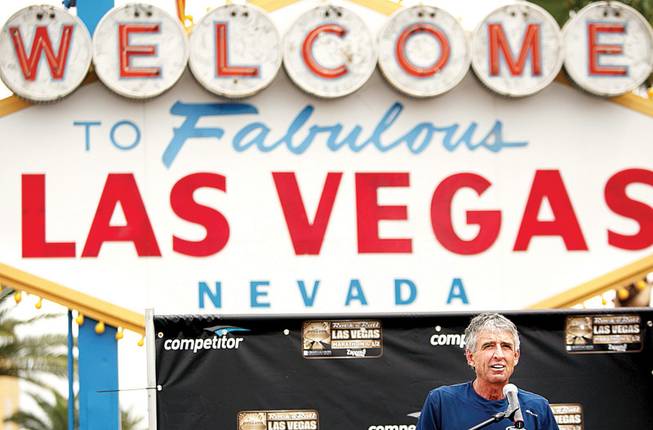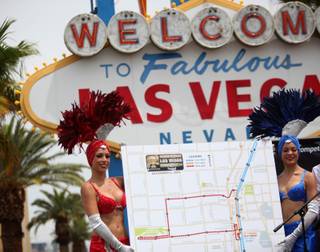
JUSTIN M. BOWEN / LAS VEGAS SUN
Frank Shorter, the 1972 Olympic marathon gold medalist, speaks at a news conference Wednesday in which the Rock ‘n’ Roll Las Vegas Marathon route was announced. Shorter took time out to talk about the 1972 race and a famous friend who died young.
Monday, June 15, 2009 | 2 a.m.
Audio Clip
- Frank Shorter, the 1972 Olympic marathon gold medalist, talks about the Rock ‘n’ Roll Las Vegas Marathon.
-
Sun Archives
Sun Blogs
Beyond the Sun
It is hard to believe that it has been 37 years since the Munich Olympics, the so-called Serene Olympics that turned out to be anything but.
Everybody who was there or watching on TV lost something during the summer of 1972, beginning, of course, with the Israeli athletes who lost their lives to a ruthless act of terrorism. There may never be a sadder or more despicable day in sports.
I was 15 then. Those harrowing images, particularly the one of the machine-gun-toting Palestinian commando on the balcony, have been seared into memory, the dark and haunting part way in the back that you try to keep there for obvious reasons.
The End of the Innocence for Don Henley came in 1989. For me, it arrived 17 years earlier.
Frank Shorter, the celebrated U.S. marathon runner, heard the first salvo as he slept on a mattress on the balcony of his dormitory room in the Olympic Village. He was sleeping on the balcony, or at least tying to, because his roommate, Dave Wottle, had sneaked his wife into their room. Shorter said at first he thought it was a door slamming.
After the hostage situation played out to its appalling conclusion, and the Games were resumed after being suspended for one day to honor and grieve for the slain Israelis, most everybody wanted to go home. Their hearts just weren’t in it anymore.
It was under this dark cloud that Shorter ran the race of his life five days later — and even it had a bittersweet feel to it.
An impostor had run into the Olympic Stadium ahead of Shorter, who was well on his way to winning the marathon. Instead of hearing a thunderous roar of admiration and appreciation, Shorter heard an eerie silence. The giant crowd thought he was running for Olympic silver, not Olympic gold.
If you were watching, you had to empathize with the man. I still do.
It had to be like winning the Masters but not hearing the ovation as you strolled up the 18th fairway; like taking Salma Hayek out on a date, only to have none of your friends witness it.
Or so I thought.
“What people don’t realize is I never ran for the cheer,” Shorter said before speaking on behalf of the Competitor Group during last week’s announcement that the Las Vegas Marathon will now operate under the Rock ’n’ Roll Marathon brand.
“So it didn’t bother me.”
Not even a little?
Not even a little, Shorter said, peeking out from under a dark blue cap that said “Yale University Track and Field” on front, an understated homage to his alma mater.
“It bothered people who were there and people who were watching on TV who thought I might have thought that I might not have won. But that was not the case. Every runner, every athlete, has a good day once in a while. I happened to have one of the best days of my life running the Olympic marathon.
“I knew nobody had passed me.”
At 61, Shorter doesn’t look much different than he did in 1972. His hair is gray now and he has willed his mustache to the Village People. But were it not for the foot on which he just had minor surgery, he still could run from here to Winnemucca before breakfast.
I asked if he had ever heard from The Impostor.
“No.”
And if he did, how would he react?
“I don’t know. But the rumor is he is one of the most powerful politicians in Munich now.”
If Shorter is dismayed by anything, it’s that he finished second in the ’76 Olympic marathon in Montreal to a suspected blood doper named Waldemar Cierpinski — and that his good friend Steve Prefontaine was not there to see it.
Prefontaine, the outspoken American distance running legend, was killed in an automobile accident in 1975 when he was 24. Shorter was the last one to see him alive. Prefontaine had dropped Shorter off after a party a minute and a half before crashing his sports car while trying to avoid another vehicle near the University of Oregon campus on a road on which they used to train.
“I miss him a lot,” said Shorter, who was portrayed by actor Jeremy Sisto in the second of two movies made about Prefontaine about 10 years ago. “You always wondered what would have happened (in Montreal). He was going to come live with me and train at altitude (in Boulder, Colo.). I guess it’s one of those things we’ll never know.”
Had Prefontaine lived, he would be 58.
“He would be working on the drug staff, with me,” said Shorter, a former chairman of the United States Anti-Doping Agency.
“A lot of kids want to emulate him and he has become an iconic figure, sort of a James Dean-ish figure. So that’s a positive thing.”
I wanted to chat with Shorter some more about Prefontaine and the ’72 Games, but it was his turn to talk up the marathon. Besides, visits to the dark and haunting side of one’s memory should be short and bittersweet.
To prolong them only seems cruel.


Join the Discussion:
Check this out for a full explanation of our conversion to the LiveFyre commenting system and instructions on how to sign up for an account.
Full comments policy